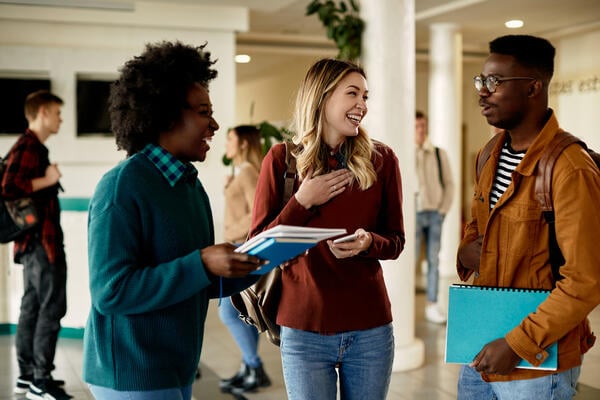
Psychology Course Encourages College Students to Make Friends
Starting college can be an exciting time for students to learn new things, make friends and live away from home for the first time. But not every student takes advantage of the opportunity.
Emmanuel College psychology professor Linda Lin said she’s seen students reluctant to engage with peers in public spaces, including on their own dorm floor, out of fear of being perceived as odd or intrusive.
“At the beginning of the semester, I always offer students extra credit points if they come see me for a 10-minute meeting and I just check in with them,” Lin said. Typically, a significant share of those students will say they have yet to make friends and get connected on campus.
“It’s become almost half or maybe a majority of the students are really struggling to find their people on campus and find their way,” Lin said.
Nationally, college students express high levels of social anxiety. One study, by the College Student Wellness Advocacy Coalition and the Hi, How Are You Project, found that 65 percent of students said they feel stress often or all the time, and 57 percent reported feeling anxious, worried or overwhelmed frequently.
Lin thinks this could be due in part to the pandemic’s role in hindering social skill development as well as changing social norms among adults in the U.S., who now prioritize relationships built online or via phone-enabled connections, rather than in shared physical spaces.
In response, Lin designed a course on positive psychology and happiness to demonstrate the evidence-based practices that can improve student well-being and push them out of their comfort zones.
How it works: The course covers topics in positive psychology and the research behind those principles. Content includes stress management, connection to nature, exercise and mental health, gratitude, spirituality, optimism, self-compassion, mindfulness, and generosity.
The class is an upper-level psychology elective, so the majority of students enrolled are junior or seniors majoring in psychology, though about 20 percent are nonmajors, Lin said.
Throughout the semester, students receive assignments to practice various techniques to boost their own well-being, ranging from taking a nature walk to writing a letter expressing thankfulness or performing a random act of kindness.
Lin’s most controversial assignment is asking students to talk to three people they don’t know over two or three days. “It can be a stranger you’re making small talk with, or someone that you see in your regular day that you’ve never introduced yourself to,” she said.
Students have said they’d rather drop her class than do the assignment, Lin said. “The social anxiety is so high, they anticipate it being super awkward, super anxiety-provoking, that people are gonna think they’re weird.”
But so far, none of her students has reported a bad experience; instead they’ve come back pleasantly surprised by the interactions. Some have even made lasting friends.
The impact: The class has received an overwhelmingly positive review from students who have taken it, Lin said, with some graduating seniors telling her it had a huge impact on them or that the course changed their life.
“A lot of students, generally, by the end of the course, are shocked that these little things make them feel better,” Lin said. “A lot of them were saying, ‘I technically know I should be doing these things, but this course gave me an opportunity to actually do them.’”
Some students shared her lecture recordings (PowerPoints with audio overlaid) and assignments with their families and friends, in the hopes that the content could benefit their health and well-being, as well.
Lin also conducts pre- and postassessments of student happiness and well-being throughout the term. She found that from the first class in September to the final one in December, students report a 20 percent jump in their scores. And that’s on top of seasonal blues and stressful final exam season feelings, Lin said.
The practices helped all students boost their happiness and well-being, but the greatest gains were among students who were already struggling, especially those receiving clinical mental health support.
“One student was like, ‘My therapist wants to talk to you—this made such a big difference in my life,’” Lin said.
Lin is collecting data from the course for future research and has also taken her curriculum out of the classroom, training resident advisers and other campus community members on how to make friends.
“I think everybody’s a little bit concerned about this, and I’m just trying to go out and take the science everywhere, because I think this should not be behind a paywall,” Lin said.
Are you noticing and responding to a lack of peer engagement and community on your campus? Tell us more about it.
Source link



